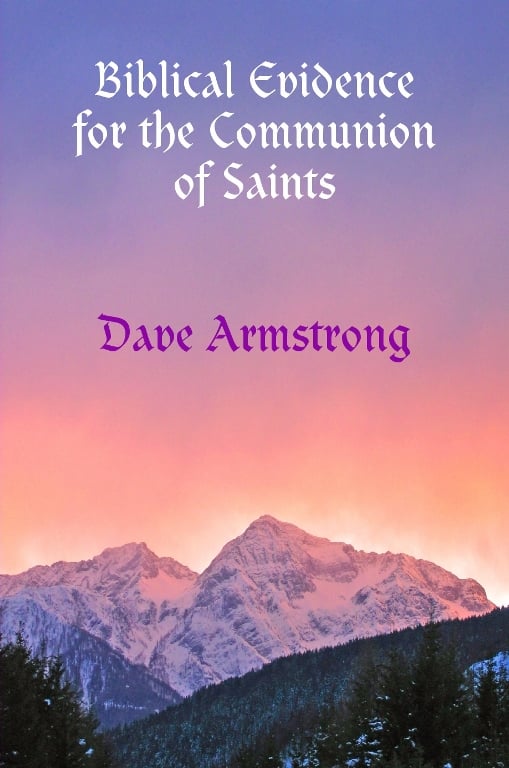
Henry R. Percival, D.D. (1854-1903) was a prominent American Episcopal priest and author of many books. This is a reply to a few portions of his book, The Invocation of Saints Treated Theologically and Historically (London and New York: Longmans, Green, and Co., 1896). As a High Church Anglican, he substantially agrees with us on this general topic. So I am only quibbling with him over a few things. His words will be in blue. I use RSV for Scripture citations.
*****
In the year 1549 it was evidently the mind of those who were responsible for the compiling and translating of the Prayer-book, that the only way to be sure of avoiding corruption, and the superstition consequent thereupon, was by omitting all invocations whatever. (pp. 18-19)
This is far too often the “solution” of Protestantism: if anything is at all corrupted, get rid of the whole thing; in other words, “throw the baby out with the bathwater.” That’s no solution at all; it’s not even the vaunted “reform.” It has led to the truncated, bare minimum, hollowed-out Christianity Lite that is many Protestant denominations today: which is the flip side difficulty at the other extreme on the spectrum of corruption in practice of good things.
First, let me clearly state that the Roman Church has shown herself most anxious to remove this ” Romish doctrine,” and to restore the practice to its first purity. In the Twenty-fifth Session of the Council of Trent, holden in 1563 — that is, eleven years after the setting forth of this Article in its first form, and one year after its adoption in its present form (a fact which shows that the article cannot possibly be looked upon as drawn up to condemn the decree of Trent, since at that time it as yet had no existence), the Fathers decreed as follows : —
Moreover, let every superstition in connection with invoking the saints be done away. Let all base questionings be cut off. Finally, let all lasciviousness be avoided (Dec De Purgatorio).
It is, then, not denied by the Church of Rome that, at the time of the Reformation, there were abuses with regard to the invocation of saints which needed reformation, and we have the contemporaneous record of some of these. (pp. 36-37)
There are always abuses and lack of understanding among the more ignorant portions of any religious group whatever. All groups — including Catholicism — reform themselves constantly — in terms of practice ‘on the ground” — or should, if they don’t. The problem we usually encounter in Protestant polemics against Catholicism, however, is that corruptions in Catholic practice are compared to the most sophisticated teachings of Protestants, such as Calvin or Chemnitz: which is a glaring double standard. If we’re going to talk about corruptions, then it should be applied across the board; not only to Catholics.
But by and large, to have a substantive discussion, we can only objectively analyze official proclamations of doctrine. The proper comparison is between Catholic and Protestant official doctrines and confessions. Percival himself cites Trent and other magisterial sources, as well as Doctors of the Church like Aquinas and Bellarmine. So he doesn’t fall into this silly practice.
A prevalent ” Romish doctrine ” seems to have been that the saints were given by God particular departments to have under their special care. To this we find allusion in the “Articles about Religion, set out by the Convocation” in the year 1 536, where we read that —
it is very laudable to pray to saints in heaven everlastingly-living, whose charity is ever permanent, to be intercessors and to pray for us and with us unto Almighty God. … So that it be done without any vain superstition as to think that any saint is more merciful or will hear us sooner than Christ, or that any saint doth serve for one thing more than other, or is patron of the same. (pp. 37-38)
First of all, the Catholic Church never taught that “any saint is more merciful or will hear us sooner than Christ”. That’s simply an insulting, groundless, gratuitous caricature. But as for patron saints, I fail to see the slightest objection to it, let alone harm. It’s simply common sense and “division of labor”: so to speak. St. Paul discusses these sorts of differential tasks when describing the function of the Body of Christ:
1 Corinthians 12:4-11, 17-18 Now there are varieties of gifts, but the same Spirit; [5] and there are varieties of service, but the same Lord; [6] and there are varieties of working, but it is the same God who inspires them all in every one. [7] To each is given the manifestation of the Spirit for the common good. [8] To one is given through the Spirit the utterance of wisdom, and to another the utterance of knowledge according to the same Spirit, [9] to another faith by the same Spirit, to another gifts of healing by the one Spirit, [10] to another the working of miracles, to another prophecy, to another the ability to distinguish between spirits, to another various kinds of tongues, to another the interpretation of tongues. [11] All these are inspired by one and the same Spirit, who apportions to each one individually as he wills. . . . [17] If the whole body were an eye, where would be the hearing? If the whole body were an ear, where would be the sense of smell? [18] But as it is, God arranged the organs in the body, each one of them, as he chose. (cf. 12: 12-16, 19-30)
But is it true that supposedly no one can “specialize” in heaven, with regard to intercession? I don’t see any biblical case against it, but I can think of biblical analogies to it. I wrote in an article about the intercession of saints:
The Bible clearly teaches that different people have different levels of grace (Acts 4:33; 2 Cor 8:7; Eph 4:7; 1 Pet 1:2; 2 Pet 3:18). From this it follows, it seems to me, that some might specialize in certain areas more so than others, according to different parts of the Body of Christ (there is much Pauline teaching on that). . . . an ironclad argument against it from Scripture is rarely made.
The fact remains that “The prayer of a righteous man has great power in its effects” (James 5:16). In the larger context of that passage, James states:
James 5:17-18 Eli’jah was a man of like nature with ourselves and he prayed fervently that it might not rain, and for three years and six months it did not rain on the earth. [18] Then he prayed again and the heaven gave rain, and the earth brought forth its fruit.
Would it not follow, then, that Elijah seemed to have a particular influence over weather? Therefore, why couldn’t someone ask him to pray to God about the weather, rather than someone else, since he had this record of asking for rain to cease, and it did for three and-a-half years? So he became, in effect, the “patron saint of meteorological petitions.”
We do roughly the same in this life with friends, on the level of empathy. So, for example, if a woman has difficulty with miscarriage or difficult pregnancies or deliveries, she might go to a woman who has experienced the same thing and ask her to pray to God for her.
I don’t see any intrinsic difficulty here.
Percival cites “Benedictine editors” who sum up a homily of St. John Chrysostom as, “We reap more profit from our own prayers than from those which are offered by others for us.” Percival then opines, “This is a fair summing up of the whole discussion of the saint upon the subject . . .” (p. 46)
The Catholic Church never forbade anyone to pray directly to God. That’s a non-issue. But is there a sense in which asking others to pray for us to God (to intercede) is a better, more efficient way of praying to God? According to the Bible, this is absolutely possible and in many cases preferred. The Catholic position is that it’s best, and always possible, to “go straight to God” in prayer, unless there happens to be a person more righteous than we are in the immediate vicinity, who is willing to make the same prayer request. Then the Bible — not merely the Catholic Church — recommends that we ask them to intercede, rather than asking God directly. If someone wants to be biblical and to follow the biblical model of prayer and intercession, it would include this practice.
The Bible states that “the eyes of the Lord are upon the righteous, and his ears are open to their prayer” (1 Pet 3:12), and “When the righteous cry for help, the LORD hears” (Ps 34:17), and “the prayer of the upright is his delight” (Prov 15:8), and “he hears the prayer of the righteous” (Prov 15:29), and “we receive from him whatever we ask, because we keep his commandments and do what pleases him” (1 Jn 3:22), and “If I had cherished iniquity in my heart, the Lord would not have listened” (Ps 66:18; cf. 66:19-20).
Having established this principle of scriptural prayer, we see how it is carried out in the case of very holy people. God told Abimelech that Abraham would pray for him, so he could live, “for” Abraham was “a prophet” (Gen 20:6-7). “All Israel” (1 Sam 12:1) “said to Samuel [the prophet], ‘Pray for your servants to the LORD your God, that we may not die’. . .” (1 Sam 12:19). God told Job’s “friends”: “my servant Job shall pray for you, for I will accept his prayer not to deal with you according to your folly” (Job 42:8).
Why did God listen to Job’s prayers? It’s because God Himself stated that “there is none like” Job “on the earth, a blameless and upright man, who fears God and turns away from evil” (Job 1:8). King Zedekiah asked the holy prophet Jeremiah to pray for him and the country (Jer 37:3; cf. 42:2: “[they] said to Jeremiah the prophet, ‘Let our supplication come before you, and pray to the LORD your God for us’ “).
If we go to a more righteous or holy person and ask them to pray for x, then x is far more likely to happen than if we go to God directly (because we are less righteous). Therefore, it’s more “efficient” and “better” to do this in these instances rather than go directly to God. Righteous people know God’s will better than those who are not following God with a whole heart, with all their might. Therefore, their prayers are more effective. And it’s all based on explicit biblical teaching and examples. The Bible refers to preeminent, effective prayer warriors and valiant intercessors like Moses (Ex 32:30; Num 11:1-2; 14:11-13, 19-20; 21:6-8; Dt 9:18-19; 10:10), Samuel (1 Sam 7:8; 12:18-19), Elisha (2 Ki 6:18), Elijah (James 5:17-18), and King Hezekiah ( 2 Chr 30:18-20).
*
***
*
Photo credit: self-designed cover of my self-published book (2012) [see book and purchase information]
Summary: I reply to a few points of a book by Anglican Henry R. Percival (1854-1903) regarding the notion of patron saints and asking saints’ intercession rather than praying directly to God.













